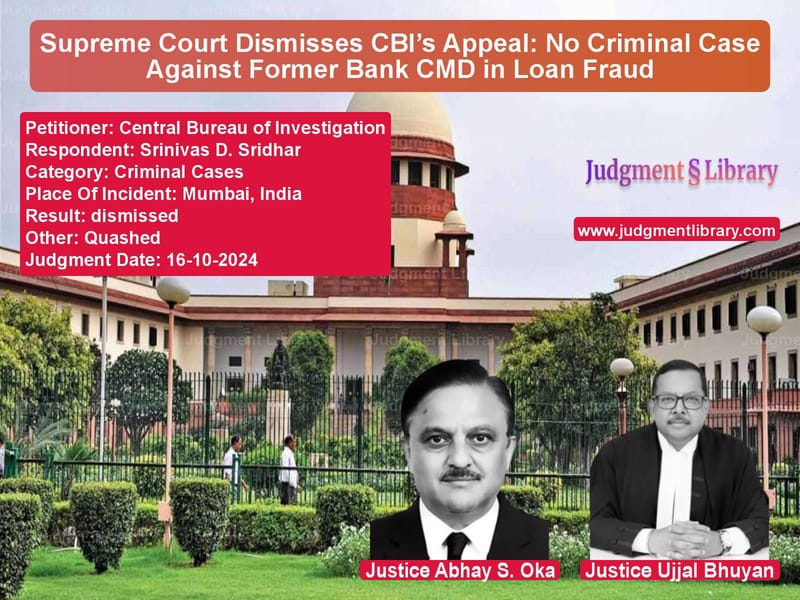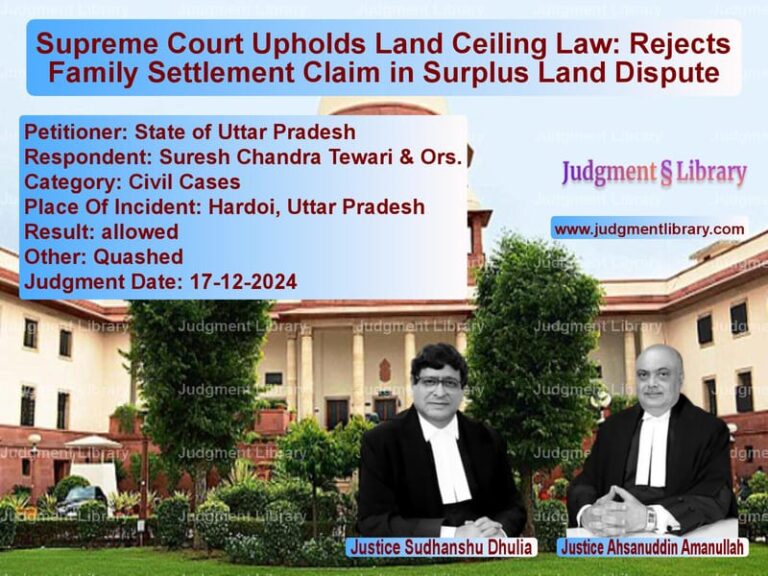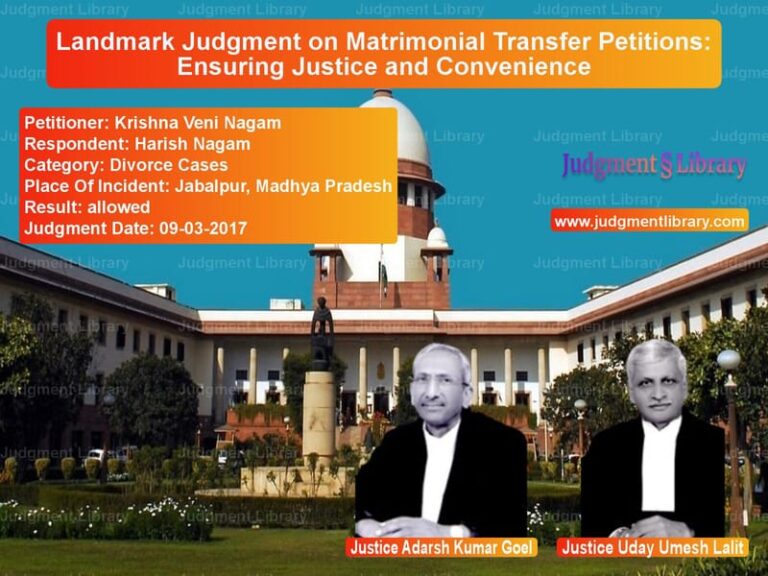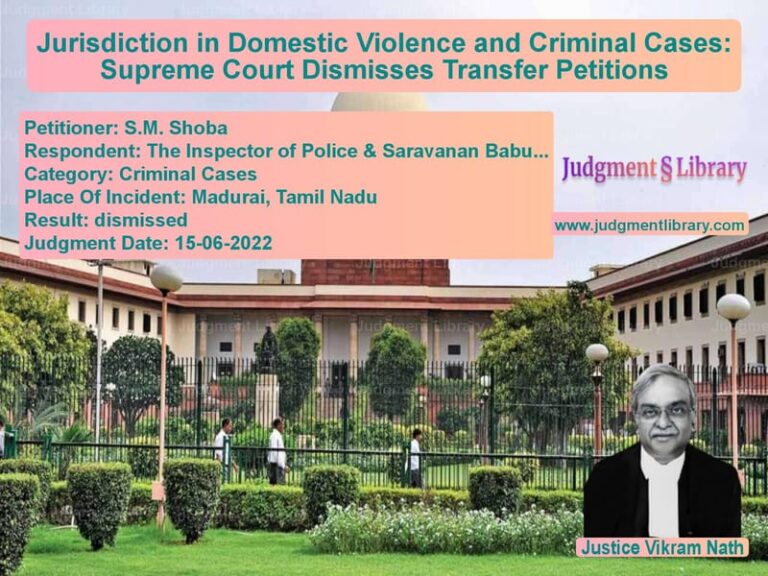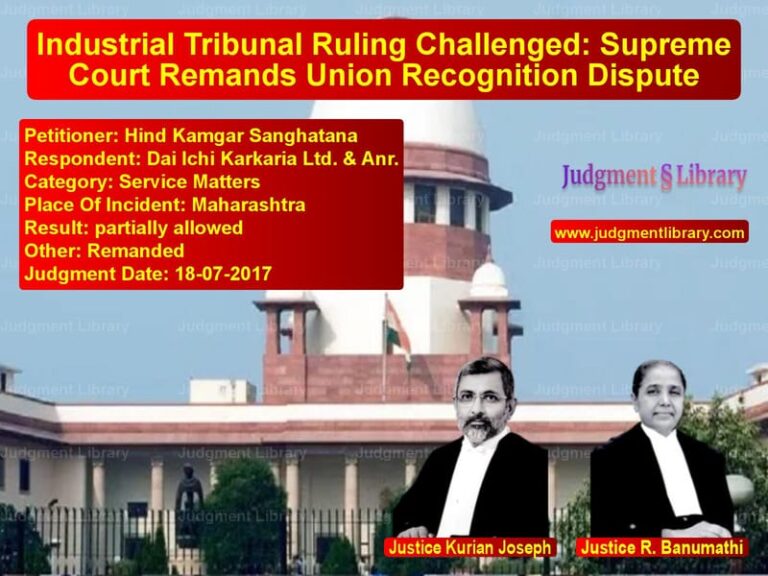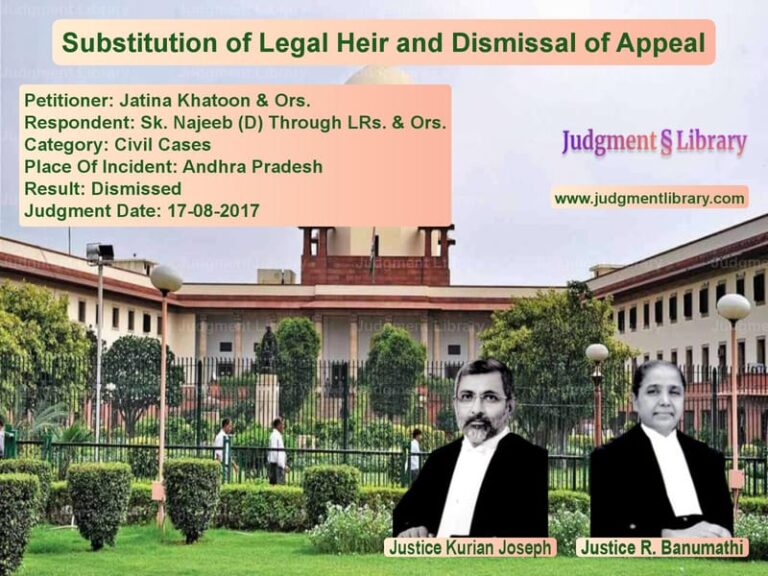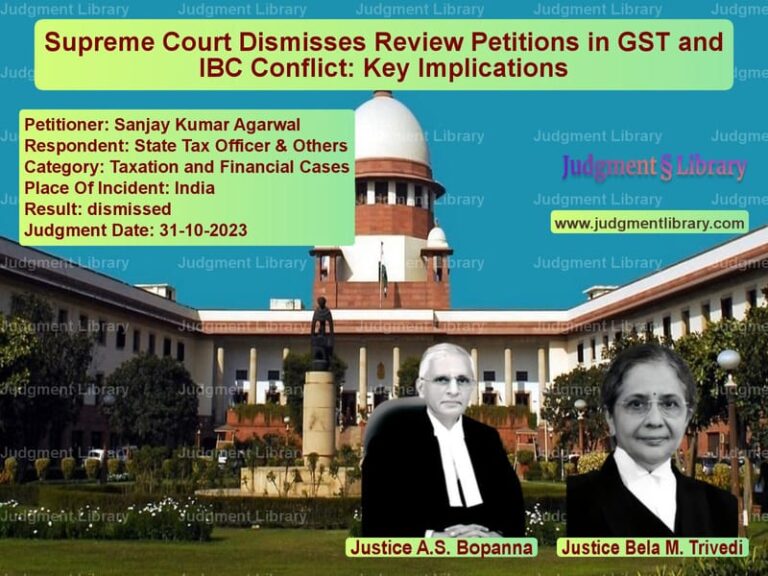Supreme Court Dismisses CBI’s Appeal: No Criminal Case Against Former Bank CMD in Loan Fraud
The Supreme Court of India, in the case of Central Bureau of Investigation v. Srinivas D. Sridhar, delivered a crucial judgment on October 16, 2024, dismissing the CBI’s appeal and upholding the High Court’s decision to discharge the accused from criminal proceedings. The case revolved around allegations of loan fraud involving Electrotherm (India) Ltd. and certain banking officials, including the former Chairman and Managing Director (CMD) of Central Bank of India. The Court ruled that mere suspicion was not enough to frame charges and found no direct evidence linking the accused to any wrongdoing.
Background of the Case
The case originated from a charge sheet filed by the Central Bureau of Investigation (CBI) in connection with an FIR registered under:
- Sections 420 (Cheating), 468 (Forgery), 471 (Using forged documents as genuine), and 120-B (Criminal Conspiracy) of the Indian Penal Code (IPC)
- Section 13(2) read with Section 13(1)(d) of the Prevention of Corruption Act, 1988
The CBI accused Srinivas D. Sridhar, the former CMD of Central Bank of India, along with senior bank officials and executives of Electrotherm (India) Ltd., of conspiring to grant fraudulent loans amounting to Rs. 436.74 crores. The loans were allegedly misused, leading to substantial losses for the bank.
Read also: https://judgmentlibrary.com/supreme-court-quashes-conviction-in-fake-caste-certificate-case/
Petitioner’s Arguments (CBI)
The CBI, represented by the Additional Solicitor General, argued:
- The accused abused his official position as CMD to sanction credit facilities without due diligence.
- The bank’s loan appraisal process was bypassed, and approvals were granted with undue haste.
- The sanctioned loans were diverted for unauthorized purposes, causing a loss of over Rs. 436 crores.
- Since conspiracy does not require every participant to be aware of all details, the accused was complicit in the fraudulent transactions.
- There was a strong suspicion of criminal misconduct under Section 13(1)(d) of the Prevention of Corruption Act, warranting a full trial.
Respondent’s Arguments (Srinivas D. Sridhar)
The respondent, represented by senior counsel, countered:
- There was no direct evidence linking him to the fraud.
- Loan approvals were processed through established banking procedures and were not an individual decision.
- The approvals passed through the Loan Advisory Committee and the Management Committee, which included multiple senior officials.
- The prosecution failed to show that he had any personal financial benefit from the transactions.
- The case against him was built on mere suspicion, which is insufficient to frame criminal charges.
Supreme Court’s Analysis and Judgment
Absence of Direct Evidence
The Supreme Court observed that the prosecution failed to establish any concrete evidence linking the accused to an illegal act. The Court stated:
“Mere suspicion against an individual, without sufficient legal evidence, cannot justify framing of charges in a criminal trial.”
Due Process Followed in Loan Sanction
The Court noted that the loan proposal passed through various levels of scrutiny, including:
- Loan Advisory Committee
- Credit Risk Management Department
- Approval by the Management Committee
The Court found that the accused’s role was limited to signing the approval after the required committees had vetted the proposal. The judgment stated:
“Taking the material in the charge sheet as it is, complicity of the respondent is not made out.”
No Evidence of Personal Gain
The Supreme Court emphasized that there was no evidence suggesting that the accused had received any personal financial benefits from the loan transactions.
“There is no material to suggest that the accused derived any monetary advantage from the transaction, which is a key requirement under Section 13(1)(d) of the Prevention of Corruption Act.”
Judicial Precedent on Framing of Charges
The Court referred to its earlier rulings, reiterating that strong suspicion alone does not meet the legal threshold for criminal prosecution.
“At the stage of framing of charges, courts must ensure that no individual is subjected to criminal trial based on conjectures and surmises.”
Key Takeaways from the Judgment
- High Burden of Proof for Criminal Charges: The prosecution must present clear and direct evidence before an accused can be made to stand trial.
- Protection Against Misuse of Criminal Law: The ruling ensures that officials cannot be prosecuted merely for administrative decisions unless there is evidence of criminal intent.
- Importance of Institutional Decision-Making: The decision reinforces that when loans are sanctioned following established protocols, individual liability should not be presumed.
- Prevention of Unwarranted Harassment: The ruling prevents honest banking officials from facing criminal trials without substantial evidence.
Impact of the Judgment
The Supreme Court’s decision is expected to have a profound impact on how banking fraud cases are prosecuted in India:
- Clarifies Accountability: The judgment differentiates between procedural lapses and criminal misconduct.
- Precedent for Future Cases: The ruling will likely be cited in cases involving allegations of financial irregularities against senior executives.
- Guidance for Banking and Financial Sector: The decision will encourage banks to ensure due diligence while protecting officials from baseless accusations.
Conclusion
The Supreme Court’s judgment in Central Bureau of Investigation v. Srinivas D. Sridhar serves as a landmark ruling that upholds the principle of fairness in criminal prosecutions. By dismissing the appeal and affirming the High Court’s decision, the Court has reinforced the necessity of clear evidence before prosecuting officials for financial misconduct. This ruling not only protects individuals from baseless litigation but also sets a strong precedent for the prosecution of financial fraud cases in India.
Petitioner Name: Central Bureau of Investigation.Respondent Name: Srinivas D. Sridhar.Judgment By: Justice Abhay S. Oka, Justice Ujjal Bhuyan.Place Of Incident: Mumbai, India.Judgment Date: 16-10-2024.
Don’t miss out on the full details! Download the complete judgment in PDF format below and gain valuable insights instantly!
Download Judgment: central-bureau-of-in-vs-srinivas-d.-sridhar-supreme-court-of-india-judgment-dated-16-10-2024.pdf
Directly Download Judgment: Directly download this Judgment
See all petitions in Fraud and Forgery
See all petitions in Money Laundering Cases
See all petitions in Extortion and Blackmail
See all petitions in Bail and Anticipatory Bail
See all petitions in Corporate Governance
See all petitions in Judgment by Abhay S. Oka
See all petitions in Judgment by Ujjal Bhuyan
See all petitions in dismissed
See all petitions in Quashed
See all petitions in supreme court of India judgments October 2024
See all petitions in 2024 judgments
See all posts in Criminal Cases Category
See all allowed petitions in Criminal Cases Category
See all Dismissed petitions in Criminal Cases Category
See all partially allowed petitions in Criminal Cases Category

